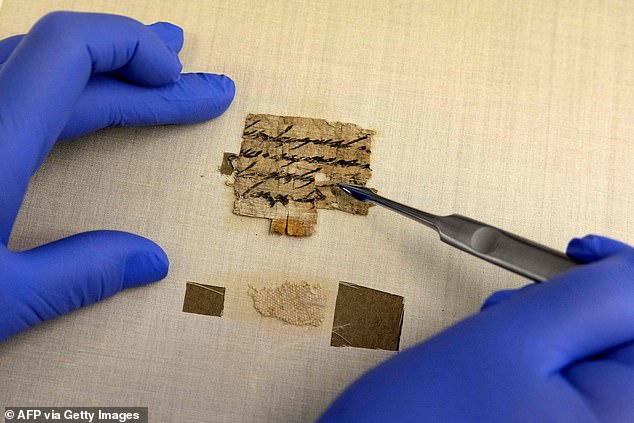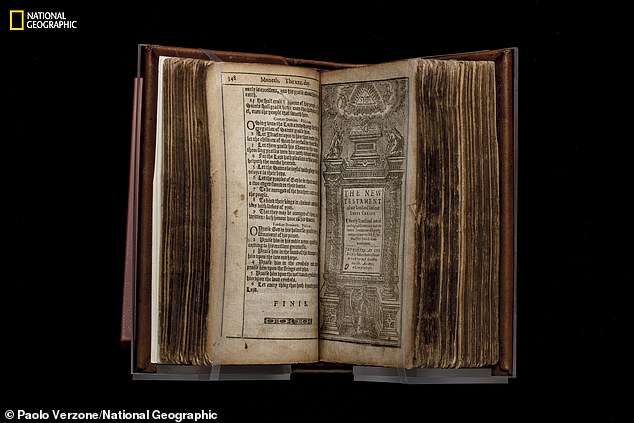It might be one of the most famous names on Earth.
But experts now say that ‘Jesus Christ’ might not be the name of Christianity’s central figure after all.
Scholars believe that ‘Jesus’ would have gone by a name in his own native language of Aramaic which is nothing like our modern version.
In fact, the name ‘Jesus’ even contains letters that weren’t used in written language until 1,500 years after his death.
Throughout Christianity’s 2,000-year history, Jesus’ original name has been obscured by layers of translation and transliteration.
Jesus’ name travelled a long-linguistic road from his own Aramaic into Hebrew, then to Greek and into Latin before it could ever receive an English translation in the 16th century.
Likewise, experts say that Jesus’ last name was definitely not ‘Christ’ but would have actually been based on his home town.
That means Jesus’ real name was most likely Yeshu Nazareen.

What language did Jesus speak?
The most obvious reason that Jesus’ name wouldn’t have sounded like the English version of ‘Jesus’ is that he wouldn’t have spoken English.
Jesus the historical figure and his disciples lived in a region of the Roman empire called Judea, which is now part of Palestine and Israel.
However, most scholars believe that Jesus was been born and raised in the town of Nazareth which is part of Galilee, a smaller province to the north.
Professor Dineke Houtman, an expert on the relationship between Judaism and Christianity from the Protestant Theological University in the Netherlands, told MailOnline: ‘We cannot know for sure which languages Jesus spoke. However, given his family background in Nazareth, we can assume his day-to-day language was Aramaic.’
Aramaic is a language which first emerged in the area of modern-day Syria and spread over much of the Middle East during the time of Jesus’ life.
Surviving Papyri from the Galilee region show that this was by far the vernacular language amongst the Jewish population and was almost certainly Jesus’ everyday language.
Furthermore, early Greek versions of the Gospel specifically record Jesus saying certain words in the original Aramaic.

For example, the Gospel records that Jesus would use the Aramaic word ‘Abba’ to mean father.
Although Aramaic shares similarities with Hebrew, they are completely distinct languages.
By the time of Jesus’ life, Hebrew was mainly used as a language of religion in the same way that Latin was for the Christian church during the Middle Ages.
Although priests would have spoken Hebrew amongst themselves and used the language for their religious texts, it wouldn’t have been spoken on a regular basis.
However, Professor Houtman points out that Jesus certainly seems to have had a knowledge of Hebrew and even a basic knowledge of Greek.
What was Jesus’ Aramaic name?
Jesus, as we would say it today with a hard ‘J’, wasn’t a name that existed at the time of Jesus’ life.
Instead, Jesus himself would have used a name in his native language of Aramaic.

Professor Houtman says: ‘His name would probably have been in Aramaic: Yeshua.
‘It is likely that this is also how he introduced himself. Another possibility is the shorter form Yeshu which is the form used in later rabbinic literature.’
According to a study published by the archaeologist Rachel Hachlili, some variation of Yeshu or Yeshua was the sixth most common name in name at the time of Jesus’ life.
That is the equivalent of being called Arthur in the UK today, according to baby name data from the Office for National Statistics.
Professor Candida Moss, an expert on early Christianity from the University of Birmingham, told MailOnline: ‘Most scholars agree that his name was Yeshua or possibly Yeshu, which was one of the most common names in first-century Galilee.’
The matter becomes a bit more difficult when we get to the question of Jesus’ ‘full’ name.
Despite a common misconception, ‘Christ’ is not Jesus’ surname but a title or honorific which means ‘Messiah’ or ‘God’s anointed one’.
During the Roman period, high-status individuals used a three-name structure made of an individual name or ‘praenomen’, a family name called a ‘nomen’, and an additional nickname called a ‘cognomen’.


This is where we get titles like Gaius Julius Caesar or Marcus Tullius Cicero.
However, as a poor Jewish man, Jesus wouldn’t have been given a full name like this.
Dr Marko Marina, a historian from the University of Zagreb, told MailOnline: ‘In the ancient world, most people didn’t have a last name as we understand it today. Instead, they were identified through other means, such as their parentage, place of origin, or other distinguishing characteristics.
‘For example, someone might be referred to as “John, the son of Zebedee” or “Mary Magdalene”, with “Magdalene” probably indicating she was from a place called Magdala.’
Since Jesus is referred to throughout the Bible as ‘Jesus of Nazareth’ or ‘Jesus the Nazarene’ it’s possible he might have used this as a practical means of distinguishing himself from other people called Yeshu or Yeshua.
That would make Jesus’ full name ‘Yeshu Narazene’.
How to pronounce Jesus’ name
Unfortunately, the exact way that Jesus and his disciples spoke has largely been lost to time.

However, Dr Marko says we can ‘make a strong educated guess based on linguistic and cultural context.’
The modern Hebrew version would pronounce it a lot more like ‘Yeh-shu-ah’.
But some Biblical scholars believe that Yeshu was probably pronounced ‘Yeh-shu’ or ‘yay-shu’ with a glottal stop at the end.
The glottal stop is a plosive constant that you find in words like ‘wet’ or ‘butter’ in accents which drop the ‘t’.
Unfortunately, the exact pronunciation is hard to determine because the glottal stop appeared to be on its way out of common use by the first century AD.
While it is hard to pin down exactly, it is believed that the weakening of this guttural sound was brought about by Greek influence.
This means that how Jesus’ name was pronounced might have depended on who was saying it and how much Greek they had been exposed to.
But given that Jesus grew up in a rural village far away from Greek-speaking areas, he may not have avoided the majority of the ‘Helenising’ influence.


This means that Jesus would probably have stuck to the more traditional Aramaic pronunciation.
Dr Marko says: ‘Jesus would have likely pronounced his name as Yahshua or a closely related variant.
‘For example, the letter “yod” (י) in Yahshua would produce a “Y” sound, and the “ayin” (ע) at the end of the name may have been a glottal stop or a subtle guttural sound.’
How did Jesus become ‘Jesus’?
Given that we know that Jesus was called ‘Yeshu’ or ‘Yeshua’, the obvious question is why we now call him ‘Jesus’.
The answer has to do with the practice of ‘transliteration’.
When you translate a word you try and transfer its meaning from one language into another – like substituting the English word ‘dog’ for the French word ‘chien’.
But when you transliterate a word you are trying to bring the sound from one language into another.

For example, you might transliterate the Mandarin phrase ‘你好’ as ‘Ni Hao’ to capture the sound, rather than translating it into ‘hello’.
When the Gospel writers came to write the New Testament in Greek, they used a similar process to convert the Aramaic name Yeshua into something more familiar.
By this time the Jewish Bible, or Old Testament, had already been written in Hebrew and translated into Greek.
However, when those Greek translators found names like Yeshu and Yehoshua, they didn’t have all the right sounds and letters in their own language to transliterate them properly.
Professor Moss says: ‘By the first century CE there was already a precedent for transliterating the Aramaic name Yeshua as Iesous.
‘So, when Paul and the evangelists refer to Jesus – Yeshu/a – they use the already established Greek equivalent of Iesous with an “s” sound at the end.
‘When the New Testament was translated into Latin there was another slight shift, this time from Iesous was transliterated as Iesus.’
Yet one more linguistic innovation would still be required to get the familiar ‘Jesus’ we recognise today.

Before the 16th century, written texts didn’t distinguish between the letters ‘i’ and ‘j’ even though they were pronounced differently.
It is believed that the first person to make this distinction was an Italian grammarian called Gian Giorgio Trissino in 1524.
However, after his innovation, the new ‘j’ sound began to spread and translators started to put it into Biblical names.
‘In the seventeenth century when the letter “J” emerged, the “J” sound took over and Iesus shifted to Jesus,’ says Professor Moss.
Meanwhile, all the other figures named Yeshua or Yehoshua who hadn’t received so many layers of transliteration got updated to become ‘Joshua’.
Finally, we were left with the familiar anglicised names we would recognise from the modern version of the Bible.
Professor Moss adds: ‘In other words, this is a story of transliteration and of rendering a name into several different scripts from Aramaic to Greek, from Greek to Latin, and finally from Latin to English.’
This post was originally published on here







